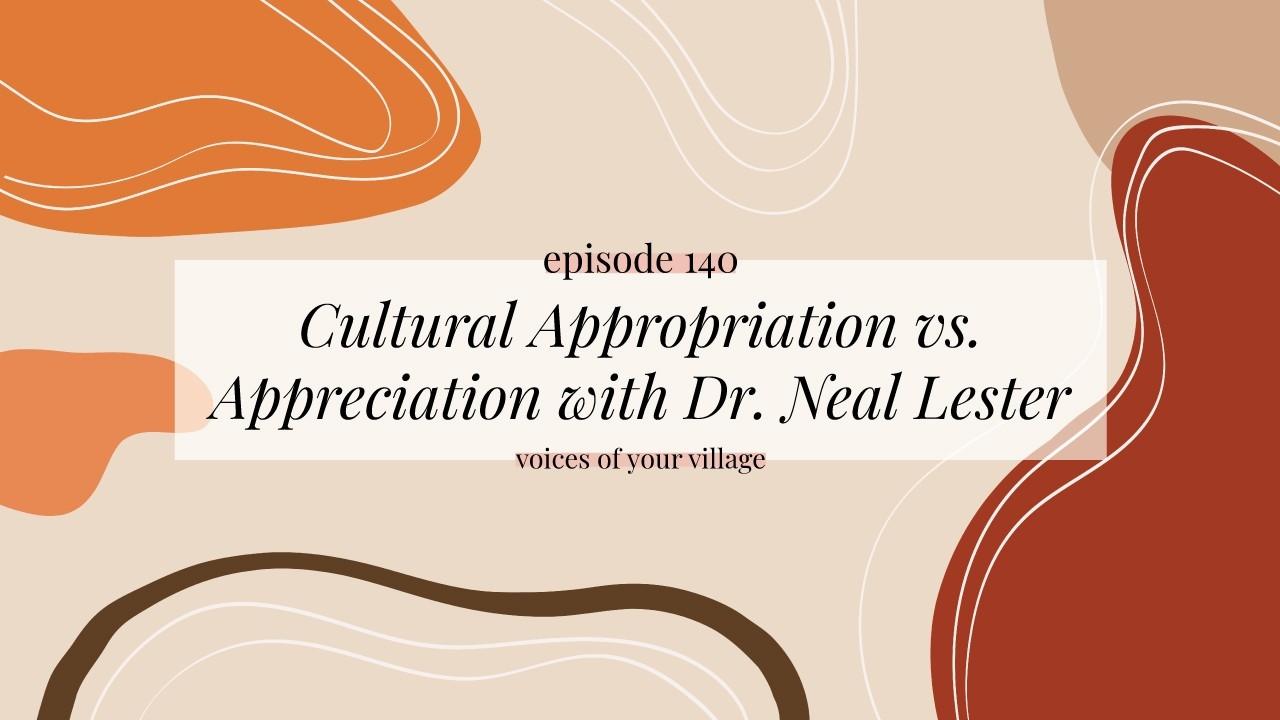Cultural Appropriation vs Appreciation with Dr. Neal Lester

Hey there, villagers! Welcome to episode 140 of Voices of Your Village! Today I got to interview Dr. Neal Lester, a professor of English at Arizona State University who studies African American Literature and Culture. I wanted to dive into conversation with Dr. Lester about cultural appropriation vs appreciation. This was a topic I personally had a lot of questions about and you villagers submitted a lot of questions about as well.
In addition to addressing this topic as we move toward Thanksgiving and Halloween, I also find it to be important for us to dive into in our day to day life. Dr. Lester brought up so many crucial ways for us to consider and be mindful of cultural appropriation in our everyday life. This is an ongoing process. It isn’t something where you are going to have one conversation with a kid and it is going to be done and over with.
I learned a lot from this conversation and I am really jazzed to bring it to your ears today. Let’s dive in!
“Literature is one lens through which we can read culture more broadly.”
Dr. Lester’s studies of African American Literature and Culture spans everything from classic literature to children’s literature, pop culture, race relations, privilege and bias, and cultural appropriation. Dr Lester has always included children’s text in his teaching of adults, from toys and puzzles to children’s literature.
“You don’t need to seek out these lessons, you just need to open your eyes. And once you see them, you can’t unsee them.”
I started by asking Dr. Lester to answer some of your questions about cultural appropriation and the learning process of really trying to understand the difference between appropriation and appreciation, and how we can pass this knowledge on to our tiny humans. “It is interesting, because when this conversation starts it is often after something has happened,” Dr. Lester explained. “It is not as complicated as people tend to make it.”
“We can’t just dismiss this as ‘If you don’t know, you don’t know’ because you should know this. If we are adults living in this society we should know that not everyone is treated equally.”
He then went on to define cultural appropriation as: When someone takes a cultural that is not their own and performs that cultural. Performance can mean dressing up as that other cultural, but also sounding like another culture. Such as when white people don’t rap as themselves, but instead rap as another culture. “It is usually white people doing it, but I also know that people of color can appropriate, while not necessarily with the same power dynamics playing out,” Dr. Lester told me.
“Appropriating is the way in which someone has stolen something from someone else, and they get credit for it. It is plagiarizing in that the people who have created the culture are not benefiting from their labor. On the other hand, appreciation comes from the consumption of other cultures and then not feeling the need to perform it. Appropriation is about the performative aspect.”
I then asked Dr. Lester to speak more about the aspect of power dynamics in cultural appropriation. Because this can go in so many directions, he gave me this as an example: There are white people whose names we would recognize instantly in terms of books we should go read right now and it doesn’t mean that those folks aren’t intellectually able to deliver that, the problem comes because these white people who are “experts” are not experts on lived experience, yet they are the ones topping The New York Times bestseller lists.
“When one knows the history, one can then self-sensor what you are going to perform.”
Dr. Lester went on to explain the intricacies of cultural appropriation and how much learning we have left to do. In addition to diving into how to approach Halloween with young kids, we also explored many examples of historical cultural appropriation and the other ways in which we appropriate marginalized groups. There are so many layers to this work, and always more to learn. This episode is full of incredibly important insights and information thanks to Dr. Lester.
Thank you for taking the time to speak with me today, Dr. Lester.
Until next time,
Xoxo
Alyssa
